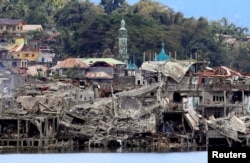Philippine President Rodrigo Duterte said he is planning to ask Beijing, during this week’s Asia-Pacific Economic Cooperation (APEC), what its intentions are in the South China Sea and if Southeast Asian countries will be allowed to freely navigate the disputed, strategic sea.
During his almost 18 months in office, Duterte has adopted a largely nonconfrontational approach toward Beijing and its competing claims in the South China Sea.
Presidential spokesperson Ernesto Abella explained in October 2016 that confrontation didn’t serve the interests of the Philippines, which was why Duterte was “committed to a process of engagement and negotiation” that would ensure that Manila’s rights are respected and protected.
Signal to US, China
Scott Harold, Rand Corp. associate director for the Center for Asia Pacific Policy, said Duterte’s plan to raise the issue now may be because the Philippine leader trying to play hard to get with Washington, while at the same time signaling China that not everything it does is OK.
“If he wants to extract resources or commitments … or appear to his base to be sufficiently patriotic, nationalistic, or what have you ... he needs to stand up for the Philippines’ claim,” Harold said.
While Duterte has been content to downplay a July 2016 Permanent Court of Arbitration (PCA) award in favor of the Philippines, Harold notes Duterte must also convince his supporters that he’s doing enough to merit their trust.
Evan Rees, an Asia-Pacific analyst with the Texas-based think tank Stratfor, said Duterte’s approach may have another explanation.
“This softer approach to China isn’t because he’s trying to pursue a softer approach permanently with China, because he’s a Philippine nationalist … and he’s trying to shore up the Philippines position,” Rees said. “The Philippines is in a vulnerable spot, where it’s a maritime nation that needs to shore up its claims in the South China Sea. But it also has all sorts of internal problems to deal with.”
Now that the government has declared victory over Islamic State group-aligned militants who laid siege to the city of Marawi and the peace process is moving forward, Rees said Duterte now possesses the opportunity to push forward the Philippines’ maritime interests.
Is Duterte too late?
China, however, claims almost the entire South China Sea, through which about $3 trillion in goods passes each year. Beijing also has repeatedly said the Permanent Court of Arbitration had the jurisdiction to hear Manila’s challenge and rejected the award.
With numerous artificial islands developed by China in disputed waters, is it too late to raise the question of China’s intentions?
No, “because there are still things that the Philippines want,” Rees said, such as economic development concessions and engaging in joint drilling projects.
Rees said that by taking a slightly harder stance now, the Philippines can secure those things later as China and the Association of Southeast Asian Nations (ASEAN) develop a code of conduct for the South China Sea.
The Rand Corp.’s Harold said preventing China from more building in the disputed waterways is likely beyond the capacity of any of the countries in Southeast Asia.
It’s not fair to say, “look, he has failed to stop China … since that was not something that was within his or anyone else’s capacity,” he added.






